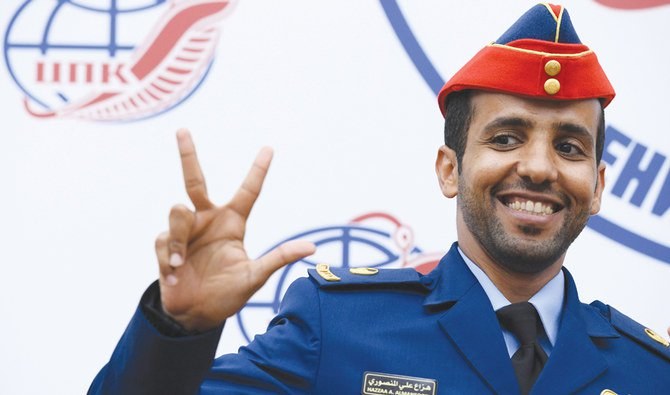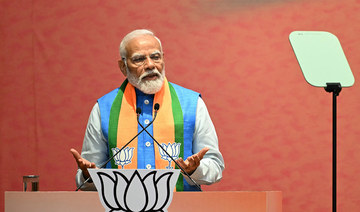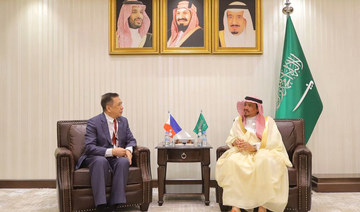ABU DHABI: Come Sept. 25, Hazza Al-Mansoori of the UAE will become the third Arab to travel into space. On that day, at exactly 6.56pm, Al-Mansoori will blast off to the International Space Station (ISS) on board a Soyuz-MS 15 spacecraft. With Al-Mansoori making the historic journey with two other astronauts, an American and a Russian, the hope is that he will be inaugurating a new era of Arab participation in space exploration.
The honor of being the first Arab in space goes to Saudi Arabia’s Prince Sultan bin Salman bin Abdul Aziz Al-Saud, who was one of the astronauts on board the space shuttle Discovery as part of a NASA mission 34 years ago.
Two years later, Muhammed Faris, a Syrian military aviator, became the second Arab to journey into space.
Al-Mansoori is currently in quarantine alongside the other two crew members — Russian commander Oleg Skripochka and Nasa astronaut Jessica Meir — at the Baikonur Cosmodrome in Kazakhstan.
In a statement, Yousuf Hamad Al-Shaibani, director general of the UAE’s Mohammad Bin Rashid Space Center (MBRSC), acknowledged the support of NASA, the European Space Agency and Roscosmos.
“The UAE’s first mission to the ISS is the result of extensive efforts by dedicated individuals and organizations in the UAE,” he said, “and also the result of important strategic partnerships with major global space agencies … who spared no effort in preparing our astronauts and providing them with all the support and training they need.”
A father of four with a bachelor’s degree in aviation sciences from Khalifa bin Zayed Aviation College, Al-Mansoori previously said he applied for the astronaut program because it was his dream as a child “and our leaders encourage us to achieve our dreams.”
Al-Mansoori and his comrade Sultan Al-Neyadi — the UAE’s chosen backup astronaut — were selected from 4,022 applicants to the UAE Astronaut Program after a series of advanced medical and psychological tests as well as personal interviews conducted to the highest international standards, according to UAE state news agency Wam.
On being handpicked, Al-Mansoori said: “When I was told I was selected for the program, it was difficult to express how proud and honored I felt. I was euphoric.”
Before applying for the program, Al-Mansoori — who has amassed more than 14 years of experience in military aviation — was a pilot and flew the UAE air force’s F-16 Block 60, one of the world’s most advanced jet fighters.
IN NUMBERS
38th - UAE’s place in list of nations to have sent a citizen to space.
3rd - Arab astronaut honor will go to Hazza Al-Mansoori.
34 - Gap in years between first and third Arab in space.
562nd - Person to be sent into space will be Al-Mansoori.
18 - Total number of countries whose citizens have been to ISS.
He was also one of the first Arab and Emirati pilots to take part in the Dubai Air Show’s celebrations of the 50th anniversary of the UAE armed forces.
“A lot of things are happening in my mind from now till the launch,” Al-Mansoori was recently quoted as saying. “I’ve prepared for this mission but not only from here,” he said. “It started from my childhood, from how my parents raised me, the confidence I gained from my life; thanks to our leadership for giving me this opportunity today to represent my country.
“I will try to remember each second of the launch because it will be really important for me to share with my country, with the world and the Arab region that experience.”
A similar sense of wonder and excitement gripped the Middle East when Prince Sultan became, at the age of 28, the first Arab astronaut. Currently the chairman of the Saudi Space Agency, Prince Sultan, son of Saudi Arabia’s King Salman, was the first Arab, Muslim and royal to travel into space on June 17, 1985.
Also read: Our interactive story about Saudi Prince Sultan, the first Arab in space in 1985
Discovery lifted off from the Kennedy Space Center in Florida for a seven-day mission during which Prince Sultan helped to deploy a satellite for the Arab Satellite Communications Organization (Arabsat).
During a special one-on-one interview with Arab News in the lead-up to the 50th anniversary of the moon landing, Prince Sultan, recalling his remarkable journey, said: “Brave people are people who feel fear but still go forward.”
On July 22, 1987, Faris, the Syrian military aviator, joined the elite club of Arabs in space when he blasted off onboard a Soyuz craft of the USSR. Faris, who now lives in Turkey as a refugee, carried with him a vial of soil from Damascus and conducted scientific experiments alongside Russian cosmonauts.
To date, 563 people in history have gone to space, starting with Soviet cosmonaut Yuri Gagarin, who orbited the Earth on April 12, 1961. American astronaut Neil Armstrong became the first person to walk on the Moon on July 20, 1969. While Al-Mansoori will be the first Emirati to travel to space, he will not be the last. Backup astronaut Al-Neyadi has been promised the next spot on a UAE mission to space.
The UAE also has plans to launch an exploration probe to Mars to mark the 50th anniversary of the country’s foundation in 2020. The Emirates Mars Mission will launch its Al-Amal, or Hope, spacecraft from the Tanegashima Space Center in Japan.
Al-Amal is designed to orbit Mars, which has an area of contrasting brightness and darkness that was named Arabia Terra in 1979 for its resemblance to the Arabian Peninsula.
Elsewhere in the region, Morocco last year launched its second Earth observation satellite, Mohammed VI-B, while space programs have been established in Algeria and Egypt. In Saudi Arabia, institutions such as the King Abdullah University of Science and Technology (KAUST) are playing their part in educating Arab space scientists of the future. The Saudi Space Agency was set up by royal decree on Dec. 27, 2018. In comments to Arab News in July, Salem Humaid Al-Marri, the MBRSC assistant director-general for science and technology, said: “The UAE is working with the Saudi space program, as well
as with others such as Algeria, Egypt, Kuwait, and Bahrain, to boost Arab presence in the space industry. Space is bringing Arab nations together.”
For now, final preparations are underway for the UAE’s Sept. 25 voyage, after the Gagarin Cosmonaut Training Center (GCTC) in Star City, Russia officially gave the green light for the mission on Sept. 5.
Once Al-Mansoori reaches the ISS, he will present a tour of the station in Arabic and will conduct Earth observation and imaging experiences, interact with ground stations, share information, as well as documenting the daily lives of astronauts at the station.
Al-Mansoori will study the effect of microgravity compared with gravity on Earth. The effects of space travel on the human body will also be studied before and after he completes his mission. It is the first time such research will be carried out on an astronaut from the Arab region.
He will not be missing traditional Emirati food as three dishes have been prepared for his journey — the madrooba, a salt-cured fish seasoned with spices; saloona, a traditional Emirati stew; and balaleet, a sweet Emirati breakfast dish of egg and vermicelli.
After completing his role as a second flight engineer, Al-Mansoori will return to Earth aboard a Soyuz-MS 12 spacecraft.
With just days remaining before he makes history, Al-Mansoori is taking the words of Sheikh Hamdan bin Mohammed Al-Maktoum, the crown prince of Dubai, with him: “A historic space flight, the ambition of the UAE and a new challenge. Keep your morale high and embrace the challenge. May Allah bless this landmark mission.”



























